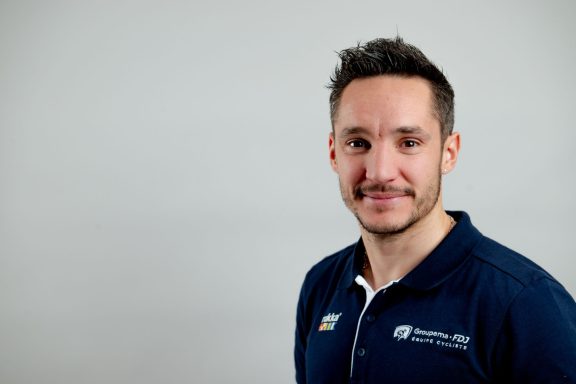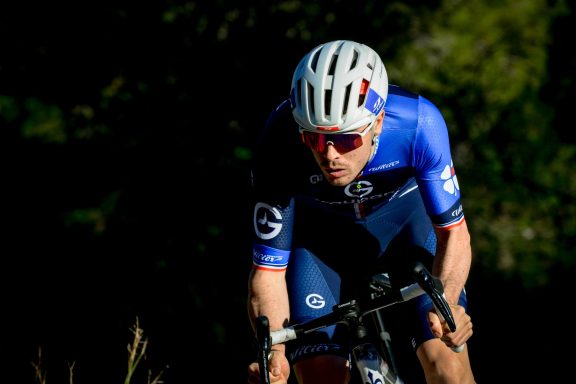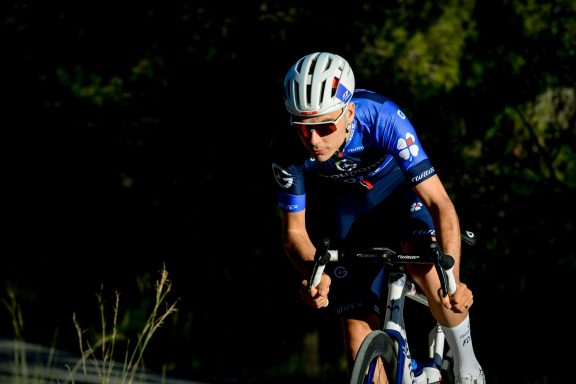Arriving in early 2019 from Ljubljana, Žiga Jerman is the first Slovenian rider to have joined the Groupama-FDJ organization since the latter was created, in 1997. At the time, he was not even born. At almost 22 years of age, he has now established himself as one of the safe bets of his generation, including after his first season with the “Conti”. We went to get to know this very determined young man.
“Cycling came to me”. Because of its convenience, or as a pure cliché, this well-known phrase today seems somewhat overused. Žiga Jerman does not present his meeting with cycling in this way, though it literally does not get much closer than that. He is 10 years old when he is introduced to cycling, after having already experienced football, basketball but also judo. “Actually, the coach from the Ljubljana club was going from school to school to test the boys,” says the Slovenian. “There were just a few young guys on the team and this coach was going in all classes to explain and show us what cycling was all about.” Naturally, he would burst in during sports courses… and therefore take the opportunity to put schoolchildren to the test. “It was a two-minutes effort,” remembers Žiga. “The top two in each class would get an invitation to join the club and see if cycling would suit them. I finished first in my class.” Until that point, he was stranger to the world of bicycle, except for Tour de France, and he was not without doubts when he gave it a go. “When I was younger, I was really lazy,” he smiles. “Whenever I started a sport, I would train well for a year and then stop”. He even remembers his father’s words at the time. “You know, cycling is a difficult sport. It’s not for you, you’re too lazy,” was the warning.
First cycling excitements and the joy to meet with friends
However, things seemed to turn out quite well from the start. “I liked it a lot straight away, I immediately had fun doing it,” he says. At this age where performance matters little, he finds excitement in two different ways. “I had made a lot of friends in the club, and in reality, that’s also why I liked going there. Besides, it was also really cool to go fast on a bike. From the first day I got on a real road bike, I realized that it was the best sport in the world.” Then came the first races. He placed eighth for his baptism of fire and more importantly got a podium in the next one. “I remember I was the happiest child in the world,” he says. However, it was followed by an 11th position in his third competition. “It was terrible for me, I was crying. I was depressed, really,” he adds. This first year of practice still allowed him to realize his abilities, and this got quite a confirmation the following season. He then won “all the races” in which he participated in Slovenia, with the exception of the national championships where he had to settle for a podium. His potential therefore came to light, his progression logically went on over the years, victories poured in and he then decided to leave aside music and more precisely the accordion, which he has been playing for eight years, to dedicate himself more to his sporting activity.
With the colours of his home club – to which he will remain loyal until his arrival at Groupama-FDJ -, Žiga Jerman continues to shine in his country, but soon stands out abroad. Three hundred kilometers east of Ljubljana, he takes part in the Coppa d’Oro, one of, if not the most famous race in Italy among the U17. Among the nearly 400 young men at the start, he is part of the quartet that breaks away to fight for the victory. Unfortunately, he “unclips” in the sprint and finishes fourth. “I understood at that time that I could be good even outside of Slovenia. Especially when you know the level of racing in Italy,” he explains. Therefore, a few weeks before the winter break that precedes his entrance into the juniors’ category, his confidence soars. Just like his commitment. “Before that, I was riding a bike just for fun,” he says. “Our coach would count our training attendance and I liked cycling so much that I only missed one during the year. I also had a group of 4-5 best friends with whom I spent all my time, on and off the bike.” After having stood up among the most talented riders of his generation in his country, Žiga get quickly selected with the junior national team. “When I started to race internationally, in the Nations Cup, I thought: “maybe I can do this later, and no longer do it just for fun”. I realized that if I continued to develop, year after year, I could maybe aim for something more.”
From junior to pro, a successful transition
In his first junior season, he raises his arms a handful of times on his homeland and nets a few placements in Italy. However, its two major objectives, the European and World Championships, don’t go as planned. He crashes in the first and punctures in the second. “It was a real disappointment because I had been consistent all year, but not enough to win at the international level and I wanted to shine on these races,” he recalls. He took his revenge the following year with a decent sixth place at the Doha Worlds, to which should be added a bronze medal in his national championship and a meaningful victory in Vertova. “I won the sprint by beating Luca Mozzato who was a very, very strong rider in Italy at that time,” he says. “He was almost unbeatable in the sprint. When I got the better of him, I realized that I could also be very fast.” For the record, a certain Tadej Pogacar leaded him out that day. “We’ve always been together,” he says. “I would help him when it was hilly and he would launch me the sprints. We were like brothers”. With the same Pogacar, he also turns “professional” with the continental team of his club, ROG-Ljubljana, in his first U23 year in 2017. “We knew that if we were among the best in juniors, we could join the big team. That was the goal, and they realized that Pogacar and I had the level for it.”
From his very first outings as a pro, Žiga stands out. “Although there are four years in the U23 category, our coach told us that we had to be ready immediately,” he says. “Thanks to this mentality, we told ourselves ’ok, we are no longer juniors, we are pros, so we have to show it’. It acted as a turning point.” This reasoning particularly bears fruit on the Tour of Slovenia, the climax of the season for the Ljubljana team. Jerman rubs shoulders with some of the biggest names in the world cycling scene but also makes his way through. “I took the breakaway on the first day, I won all the intermediate sprints and I got the white jersey at the end of the day,” he continues. “It was a great moment for me and the team”. Following this noticeable performance in front of his crowd, the young Slovenian goes to compete in the Tour of Hungary and storms his very first – and until now unique – professional success. “A massive sprint was anticipated but I attacked 400 meters from the finish because there were two corners before the line,” he recalls. “I knew I could take them faster than others and I managed to make a gap”. Dressed in the yellow jersey at the start the next day, he “gets a bit crazy” in the final sprint, ends up on the ground and abandons the next day. A few weeks later, he obtains two other podiums in class 2 races, which complete a solid first season as U23.
Joining the “Conti”, a determined and determining choice
The second, however, starts painfully. Slowed down by illness, he fails to properly prepare for his big goal of the season: the Classics. Therefore, when he gets to Ghent-Wevelgem at the end of March, his expectations don’t exceed reason. “I was a little depressed to have been sick, but actually, I was very fresh in Ghent since I had not raced,” he says. “The national coach also said to me, “Don’t worry, you can do it.” He was especially thinking to my understanding of the race”. And what was bound to happen did happen. Thanks to two attacks in the last ten kilometers and a long sprint to beat his breakaway companions but also to stay away from the peloton, the Slovenian wins the first round of the Nations Cup on the European continent. “That day, I was certainly not the strongest for the reasons I mentioned,” he says, “but I was probably the smartest. I knew where to stand and what to do at the right times”. More in shape later on, he takes a fifth place in the sprint of the ZLM Tour, another Nations Cup event, and second in the Gran Premio della Liberazione. He then endures three difficult months before netting two top-10 in the Tour de l’Avenir and four others in the Tour of Taihu Lake.
Despite this low period in the middle of the season, he is offered to join the “Conti” Groupama-FDJ for its launching year, in 2019. “My biggest goal was to join a development team”, he confirms. “I wanted to continue to progress to the highest level in order to, one day, possibly joining a Pro Conti or a WorldTour team. When I received an offer from Groupama-FDJ, I knew it was the best option for me. I already really liked the way they were doing things at the WorldTour level, and I knew it would be a perfect fit for me.” He therefore leaves his home club, his heart team, his city, his family and his friends, settles in Besançon, in a foreign country, which he doesn’t speak the language, but in full knowledge of the cause. “I knew very well why I was there,” he insists. “I wanted to achieve something on the bike and I had to go through this to try to get there, so I had no problem with all that.” The first gatherings with his new team and new teammates also validates his decision. “I felt comfortable from the start,” he says. “We were in training camp with the WorldTour team, and I realized that it was an ultra professional team in every way. And I’m not just talking about the WorldTour team! I also realized that it was a big family and not just an ordinary cycling team.”
“Winning Milano-Sanremo would be my biggest dream”
Regarding the sports side, Žiga Jerman looks forward to come back to the Classics and defend his title on Ghent-Wevelgem. However, a crash prevents him from doing so on the latter. “I was in the first echelon, in the mix for a big result, so I was really disappointed,” he confesses. He finds some energy back with the Conti during the Triptyque des Monts et Châteaux ahead of the Tour of Flanders. “I always had the Ronde in the back of my mind, because I know that this type of race suits me very well,” he says again. “I was not the strongest there, but my trainer believed in me and made me think that I could play the leading roles. I tried to save as much energy as possible and it was enough for a sixth place”. He then obtainsanother top 5 in the Nations Cup, two podiums in Class 2 races and a solid ninth place on Paris-Roubaix U23. “I was in better shape than in the Tour of Flanders, but when I feel very good, I sometimes do too much,” he says. “I wanted to attack and attack, and in the last twenty-five kilometers, I was completely empty. It was a bit of a reminder that there are still things for me to learn, especially on these races…” Towards the end of the season, he gets the opportunity to move up as a stagiaire within the WorldTour team and compete twelve days of racing with them. “It was a dream to be there,” he adds. “It was amazing to be with the big boys, on and off the bike, to see how the team works and to be able to learn from more experienced and stronger riders. I then said to myself that I was going to do everything in my power in order to, one day, like them, get to the biggest cycling league.” If that were the case, he would join many of his fellow-countrymen who today make themselves notice on the international scene. “When I see what Pogacar, with whom I have spent ten years, is doing at the WorldTour level, it is obviously very inspiring.”
In terms of profile, however, he is somewhat different from his sidekick, even if he would rather wait until he reaches the next level to define himself better. “When I look at my past results and analyse where I have the best feelings, where my mentality is best expressed, it’s on the Classics,” he insists. “This kind of race suits me really well, with rain, cold, wind, cobblestones, gravel. I love the Classics of the North, but also Milano-Sanremo, which is for me the most beautiful race of the year. It is different, so unpredictable and so open. When I see the Cipressa, the Poggio and the spectators on TV, I know it’s a race that I would like to take part in one day. So winning it would be my biggest dream.” Not essential but useful for the Primavera, the Slovenian has a good sprint: “I’m not the fastest sprinter because I don’t have a huge explosiveness, but when it’s a little harder, when the others are a little tired, this is when I can express myself the best because I can do long sprints in difficult conditions”. While waiting to find back the “adrenaline” of the bunch, Žiga Jerman tries to refine his French with the lessons provided by the team. He will then head back to the competition with the desire to show himself as he is competing his last U23 season. “This is a very important year for me, but it is not over yet! I’m still training as before and I’m even more motivated because I know the last three months will be crucial. I also know that our coaches will do everything to take us to the best of our form so that we will be ready when it starts again.”




No comment